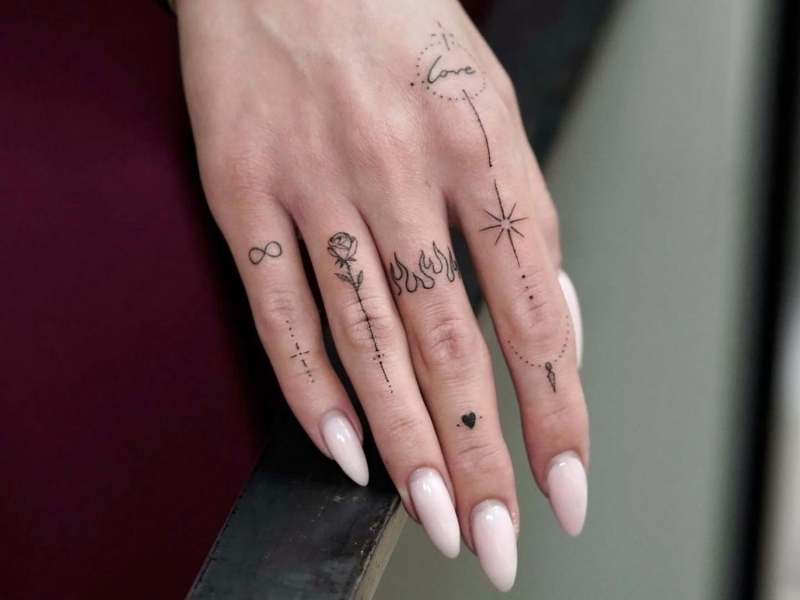
Every new tattoo requires forethought, but perhaps none require as much as your hands. Located on the most visible and hard-to-cover-up area of your body (except for your face), finger tattoos are a big deal even though they’re generally quite small. If you’re interested in tattooing your fingers, there’s much to consider first.
We spoke with tattoo artist Zakk Powers and board-certified dermatologist Elliot Love, DO, to get all the facts about finger tattoos, from the design options and pain level to the healing process. Read on for everything you need to know.
Carefully Research Your Artist
For any new tattoo, you'll want to go with a professional artist who operates in a licensed setting. For finger tattoos specifically, you need an artist who can work in tiny spaces in a precise manner. During your research process, seek out artists with clear experience on fingers; websites and social media are great places to start.
And don’t just look on your phone: It’s easy for a piece to look good on an itsy bitsy screen. This type of background check is best conducted on a computer. That way, you can see the exact precision of an artist’s work. “When researching an artist, in general, I always recommend [looking at both] their fresh and healed work,” says Powers. “With fingers, I’d definitely recommend finding someone who does them frequently or specializes in hand/finger tattoos.”
"Researching your artist, regardless of the location of your tattoo, is crucial," adds Love. "You not only need to ensure the quality of the artist's work but, depending on their style, you need to be sure [they] will be the right fit for your work."
Know Your Design Options
This is not an area for complex drawings, because there’s no room for them. “Popular designs for the fingers are usually letters or numbers,” says Powers. “You can go fine line or bold. Another popular option is the dainty ornamental design that almost looks like jewelry.” And you’ll want to stick to the outsides of your fingers: “I would leave the design options to the artist, but I would not recommend tattooing the palm side of the fingers due to increased cellular turnover and quicker fading,” warns Love.
Just because you need to go small and simple doesn’t mean you don’t have options. I used my fingers and hand to continue a produce sleeve on my arm, opting for blueberries and black peppercorns. They’re well-spaced apart, which is key to seeing each one.
Factor In the Cost
Fingers don’t take to ink as easily as other body parts (for reasons we’ll get into ahead) and they fade more over time. That means this is not a one-and-done procedure. “The fingers usually require more than one session,” says Powers. “In fact, I always try to book two sessions when scheduling with a client to ensure they come back.” While tattoo touch-ups are often free, the post-heal touch-up doesn’t mean you won’t have to come back yet again. So before embarking on this ink, make sure you’ll have the money in the medium to long term to keep up with it.
It Might Really, Really Hurt
We cannot stress this point enough: No tattoo is painless, but finger tattoos hurt. “The pain of a finger tattoo is usually more intense than other body parts,” says Powers. “This is [because] there is less tissue between the skin and the bone.”
Love explains further: "The glabrous (smooth, hair-free) parts of the fingers and palms have a higher nerve density, likely leading to higher pain intensity." On commonly tattooed areas, like your biceps, there is muscle. Conversely, your hands and fingers have very little. In turn, I found my fingers and hands to be the most painful of all my tattoos, superseding the pain of both my ribs and my upper chest.
That said, Love explains that "the sensory nerve density on the backs of the hands where there is hair is similar to the forearms and arms and, generally speaking, should not feel any different than these areas," meaning you could get lucky and not find it to be bad at all. Everyone is different.
Aftercare Is Essential (… and Kind of Annoying)
Aftercare for all tattoos is necessary for good results and to avoid infections. Like other tattoos, you can choose between a second skin bandage for the first few days or washing it twice daily. But needless to say, given how much we use our hands, it is more annoying. While the “Aftercare process is no different than any other spot on the body, it is just more difficult to maintain and keep out of certain situations such as water and sunlight,” notes Powers.
They Can Take Ages to Heal
Second skin bandages help you eschew the first phase of a scab and can lead to brighter, darker, more defined tattoos with less touching up needed. But, good luck keeping them on your fingers—because you wash your hands so often, the bandages are prone to loosening at the edges much faster than on areas like your arms and legs. And because you bend your fingers so frequently throughout the day, a new set of finger tattoos can encounter many problems even without bandages. Scabs can easily get broken or torn, leading to longer healing times.
They're Made to Fade
You can’t keep your fingers out of sunlight as easily as other areas, and that can impact how well the color takes during healing and how quickly it fades. “The fingers typically fade quite a bit. The skin is thicker and you use your hands quite often so they do not heal as well,” says Powers. Love seconds this, adding that “because of the mechanical nature of the hands causing the outer layer of the epidermis (first layer of skin) to be thicker and the constant sun exposure, fading of hand/finger tattoos, in my experience, appears to happen sooner than [on] sun-protected areas.”
The Final Takeaway
Finger tattoos can be incredibly fun, but before you get one, you need to be fully informed. Do copious research on artists, and choose one with evident experience in this area of the body and whose work matches the style of finger tattoo you want. Know that it will hurt more than other areas, and it likely won't heal as perfectly. Additionally, it will fade faster. But if you don't mind getting touch-ups every few years, finger tattoos can make great additions to your ink collection.

